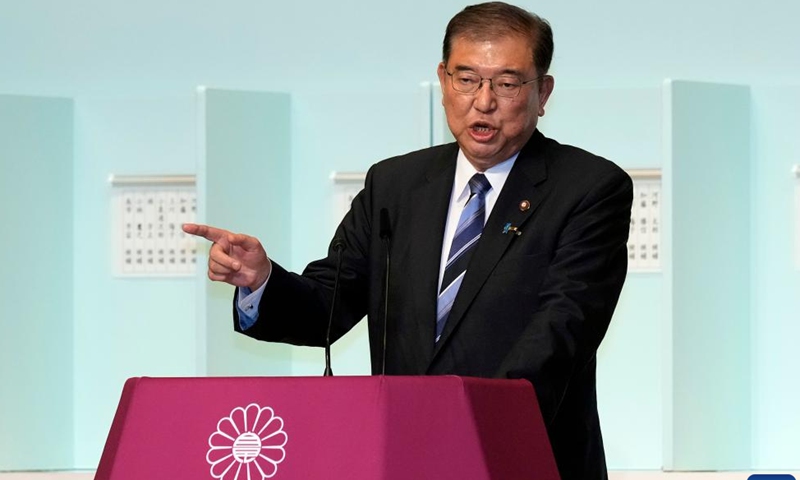Japan’s Ishiba elected ruling party leader; change in Japan’s leadership won’t affect importance of China-Japan relations, say experts

Shigeru Ishiba speaks before a runoff election at the Liberal Democratic Party's (LDP) leadership election in Tokyo, Japan, Sept. 27, 2024. (Hiro Komae/Pool via Xinhua)
Shigeru Ishiba on Friday was elected the new leader of Japan's ruling Liberal Democratic Party (LDP) for a three-year term. Ishiba is expected to become Japan's 102nd prime minister at an extraordinary Diet session on October 1 and form a new cabinet, per Japanese media.
Japan studies experts reached by the Global Times said that Ishiba's election reflects the pursuit of stability within the LDP, which hopes to mitigate the impact of the political funds scandal and maintain the LDP's ruling position in the next parliamentary elections.
Regarding China policy, the importance of bilateral relations will not change due to the change in Japan's leader, and a stable bilateral relationship aligns with the interests of both countries.
A record nine candidates participated in the election. Ishiba defeated economic security minister Sanae Takaichi in the second round.
Xiang Haoyu, a specially appointed research fellow in the Department for Asia-Pacific Studies, China Institute of International Studies, told the Global Times on Friday that Ishiba has rich political experiences, social reputation in Japan and is knowledgeable about policies. His win reflected the LDP's hope that he can lead the party with his experiences to defeat opposition parties in the next parliamentary elections to keep the LDP's ruling position.
Ishiba's opponent Takaichi, holds hawkish views on diplomacy and China policy, Xiang said. Takaichi had reportedly claimed that she would visit the infamous Yasukuni Shrine where WWII war criminals were honored, laying a dangerous potential flashpoint for Japan's relations with its Asian neighbors.
Takaichi lost to Ishiba in the second round, indicating a larger portion of the LDP wants a leader with more balanced and moderate style, and there are concerns that Takaichi's right-leaning and radical policies could pose unnecessary risks and friction.
Da Zhigang, director of the Institute of Northeast Asian Studies at the Heilongjiang Provincial Academy of Social Sciences, noted a conservative tendency among the leading candidates in the election, which reflects a resurgence of conservatism in Japanese society.
China needs to stay alert to Ishiba as he reportedly had called for creation of an "Asian NATO" by combining the US-Japan alliance and US-South Korea alliance, Da said.
Da also said Japan's internal political environment is very complicated presently, and whoever becomes the prime minister, the priority will be to address domestic issues like boosting the economy and living standards, as well as other social hotspots.
Xiang believes if Ishiba becomes the new prime minister as expected, while maintaining the overall stability of China-Japan relations, it is anticipated that Japan's policy orientation of seeking to "align with the US to contain China" and "use Taiwan question to contain China" will not undergo significant adjustments..
Although Ishiba is considered a conservative in LDP, his policies are more balanced and moderate, Xiang said, noting that although Ishiba advocates for containing China's military development, he also hopes to engage in defense dialogue and communication with China to build trust and dispel doubts.
Chinese Foreign Ministry spokesperson Lin Jian said at a routine daily press conference on Friday, in response to Ishiba's win, that China has noted the election results but emphasized that it is Japan's internal matter, and China does not comment on it.
Lin stressed that the sustained, sound, and steady development of China-Japan relations is in the fundamental interests of the two peoples and is the only right choice.
China hopes that Japan will learn from history, follow a path of peaceful development, abide by the principles and common understandings established in the four political documents between the two sides, have an objective and right perception of China, take active and rational China policy, take concrete efforts to comprehensively advance the strategic relationship of mutual benefit, and work with China to promote the sustained, sound and steady development of China-Japan relations.
The importance of China-Japan relations will not be changed by the transition of Japanese leaders, Xiang said.
Da expressed hope that Ishiba can seriously consider the development direction of Japan as a nation, take into account the welfare of the Japanese people and the interests of the business community in cooperation with China.
Ishiba should properly manage Japan's relations with the US, China, and other neighboring countries. It is important to enhance the flexibility of policies, actively create opportunities for communication and dialogue, and make positive efforts to maintain a healthy and stable China-Japan relationship, Da said.
